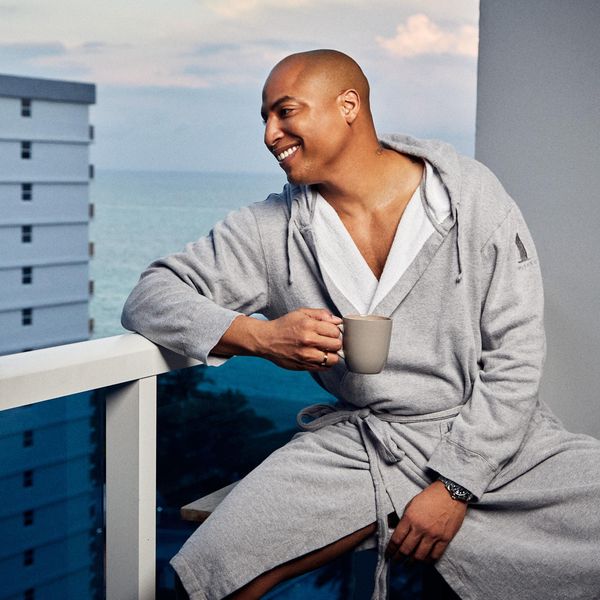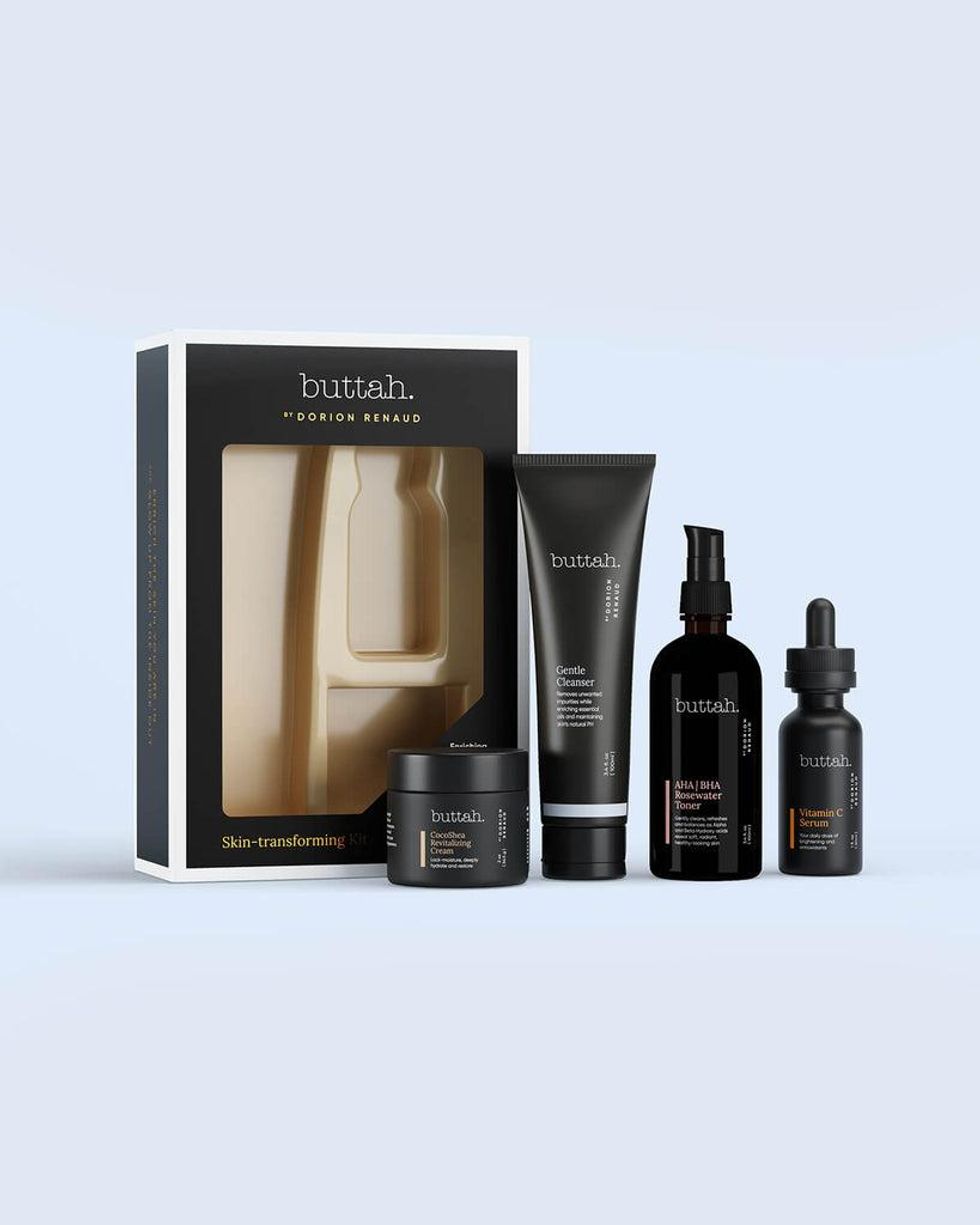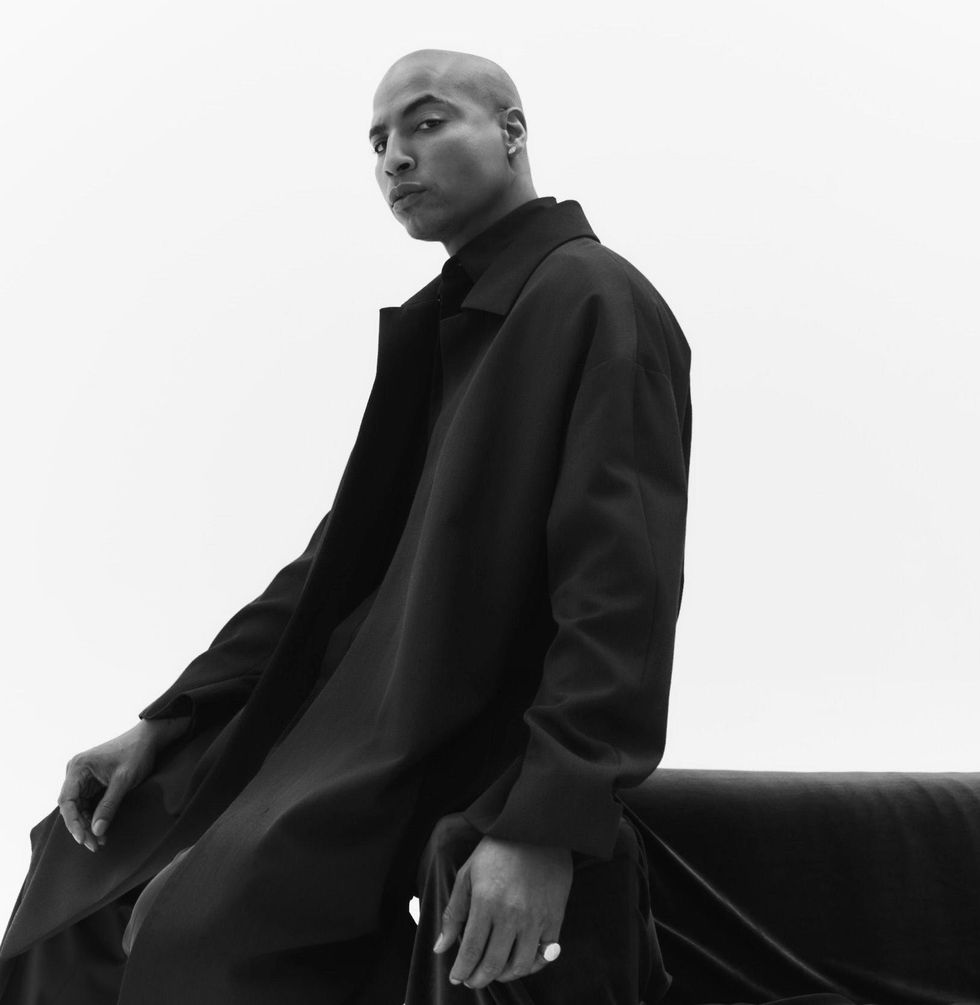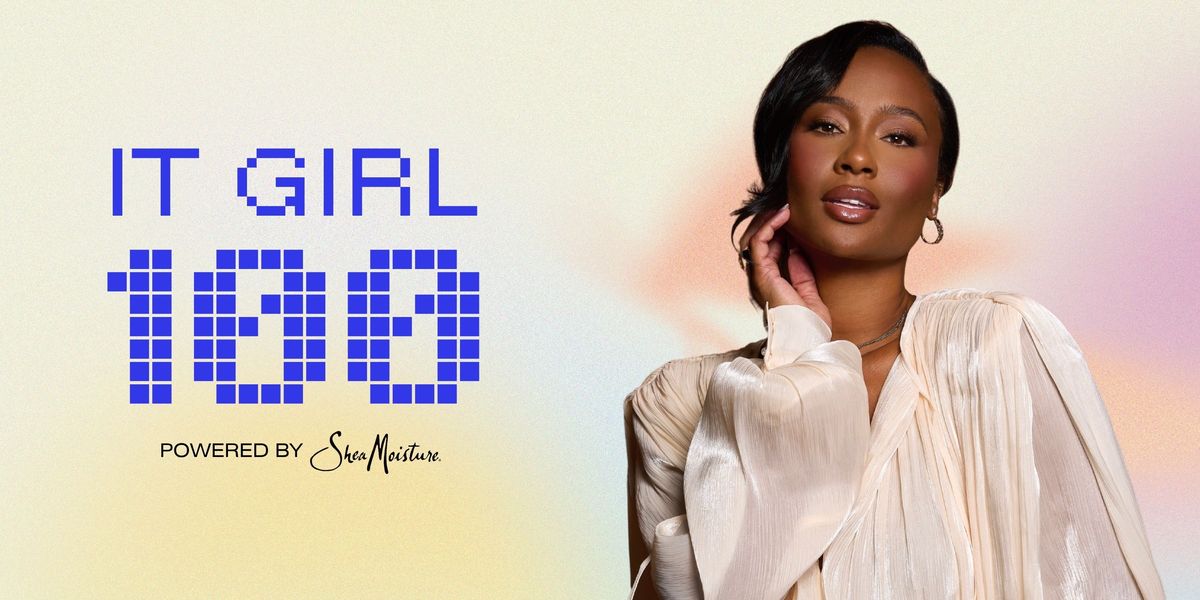How A Search For Solutions Led To Actor Dorion Renaud’s Pivot Into The Skincare Industry

Dorion Renaud was first introduced to us in 2008 on BET’s College Hill: Atlanta. Soon after, the Beaumont, Texas native saw great success as a model, gracing the pages of Vogue magazine, and as an actor, starring in Bounce TV’s hit sitcom, In The Cut. Recently, Dorion has added the title of 'entrepreneur' to his ever-growing list of accomplishments and successes over his decade-plus-long career. With the launch of his skincare line, Buttah, he has taken the beauty and skincare industry by storm, providing Black men and women with attainable solutions to their pressing skincare concerns and resulting in an all-around even skin tone.
From embarking on a quest to address his own skincare challenges to being a successful Black skincare founder with products in Macy’s, it’s safe to say that Dorion Renaud’s foray into the beauty space has left and will continue to leave a lasting legacy.
The Buttah founder sat down with xoNecole to discuss what made him go into the beauty industry, common challenges Black people have with skincare, and what inspired him to pivot from the entertainment industry into the entrepreneurial realm.
xoNecole: When did you realize that you wanted to create a skincare line?
Dorion Renaud: In high school. For one, I suffered from hyperpigmentation. I would pick at my skin if I had a pimple or something. But it wasn't the pimple so much that bothered me, it was the dark spots that it left. So I began looking for resources in my small town of Beaumont, TX and getting procedures in places where I shouldn’t have gone to get these dark spots off of my skin.
I realized there were many young people around me with those same issues. And when I got in front of the camera at about 18 or 19, I realized how much makeup was needed to cover the dark spots. It was an insecurity that I had. When they took the makeup off me, whether it be for TV or modeling, I wished that I either had makeup to cover the spots or a skincare solution.
When I was in Harlem, I found some shea butter and I started using it all over my body and my face and saw that my skin was clearing up. I thought it would have broken me out due to the fats in it, but it actually worked with my skin. And so as I started matriculating in Hollywood and doing more work on camera, it had always been a goal of mine to perfect my skin or try to keep it as clear as possible.
Soon after, everybody started asking what I was doing, and it was really just a gentle cleanser, a vitamin C serum, and the shea butter from Harlem. When I learned that there were so many people who were embarrassed to ask–especially men–what I was doing for my skin, I realized that skincare in our community wasn’t something that we were educated on properly. We were somewhat ashamed to ask for help in that area. So I wanted to create a line that was easy and efficient and that people could feel proud of. And at the top of 2018, the idea for Buttah came to me, with it launching later that year.

Buttah Skin
xoN: What was the process like creating the products?
DR: It was pretty strenuous, but for a very short amount of time. I had to learn a lot and educate myself on different ingredients. So I worked with a chemist and we got our shea butter directly from Ghana. There was a lot of trying the products and testing them to make sure they had a shelf life. Just so many things that I had no idea about before getting into beauty and skincare because I never thought I would have my own skincare line.
I always knew that I was going to be an entrepreneur. But I never thought I'd have to focus on formulas and ingredients and what they could do to your skin. So I had to dive deep into the problems that we as Black people had with our skin and the most common problems. As I learned more, I began addressing them first so that we could be a solution-based brand. Then we added other things that people can use to enhance their skincare routine.
xoN: What are some common issues that you found when it came to Black people and skincare?
DR: Hyperpigmentation is definitely one of them. The dark spots and unevenness on the skin as well as sun damage. I think a lot of Black people overlook what sun damage can do to your skin, so we developed a Mineral Tinted Sunscreen for that. But in general, breakouts and cystic acne, and discoloration were what most people complained about.
We're not an acne-based company. I was an adult dealing with adult acne and the after-effects of it. I [also] had a hard time finding products that kept me moisturized all day and used shea butter on my body because lotions were drying out 30 minutes after applying it. So I think finding moisture and ingredients that give us that even tone was important because that's where a lot of people were struggling.
They say, “Black don't crack,” but we can crack if we don’t take care of our skin.
xoN: So, what is your current skincare routine?
DR: I love to use our Tea Tree and Aloe Scrub. It's both a mask and a foam cleanser. I like to use that because I like to work out and I'm active during the day. A lot of times, you think you can’t scrub your face every day, but ours is so gentle, I tend to use that most of the time. Then I follow it up with the Vitamin C Serum which regenerates the skin and helps with fine lines and wrinkles, and my CoCoShea Revitalizing Cream. At night, I'll put the toner on just to get my face clean and fresh, and let my skin breathe.
But all of our products are used differently, depending on the climate, where I'm going, and what my skincare needs are. Every part of our system at Buttah is for something. So I even use our Charcoal Mask at least once a week to get all that gunk out of my skin and renew it.
xoN: Your line is in Macy's, JCPenney, and Ulta. How was the process of getting into retail?
DR: We're also in Bloomingdale’s and Nordstrom, and we're getting ready to launch in Saks Fifth Avenue, which I'm very excited about. It was a process. Fortunately for me, it started taking off during the pandemic. I was at home with a lot of time on my hands to think about the creativity of it, how to make it look and feel a certain way, and be specific to certain retailers. Once we got on HSN and QVC–which was amazing–it allowed me to not only talk about the products but educate people on how to use them. Then retailers started reaching out to us.
Getting into retail is a bit of a process. You have to first have to have the finances to get into these stores. I know a lot of people have dreams of being in retail but they often don't have the money to fulfill their orders. So we had to dive in and restructure as a company because it was costing a lot to go into these retailers. And also make sure that each retailer had the right products and campaigns because every retailer had separate campaigns. Along with going in and training the employees in each store, which is something that I do, I go in and educate them so that they give people the proper education when they come into the stores.
Retail was a totally different game. Once I got the art of direct-to-consumer down, then we went into retail. But I tell people all the time that I'm learning as I go. Because this has been such a fast process, I'm learning the dos and don'ts. A lot of times, a brand will be successful online but won’t do as well in retail, so you have to transition how you promote it and transition how you market it specifically for retailers.
xoN: You said that you always wanted to be an entrepreneur. Did being in the spotlight after 'College Hill' inspire you to pivot from TV to business?
DR: I think it inspired me to understand that I could use my TV presence as a way to grow an audience in different arenas. I was also tired of relying on the entertainment industry to pay my bills. I was looking for something that was for me. In doing television shows and acting, I was always waiting for a “yes” from someone, or always waiting for somebody to tell me what lines to say and what to do. I mean, I'm 34 now and shot College Hill at 20, so I kind of felt like a puppet. I was just doing whatever the industry told me to do to stay successful.
I wanted something that I was in control of and how successful it was, and that it wasn't in somebody else's hands. I think having fame at a young age allowed me to see it and not get too excited about it because I've had it, I've lost it, and I've had it again. And you tend to place value on things that are more purposeful outside of just being in front of the camera. I realized after every season of In The Cut ended, I felt empty. I felt like I needed to find another gig or was hoping that we would get picked up again, and I didn't want to put all my value into that anymore.
Now I still do it. But I'm able to do it through Buttah. I’m able to model through Buttah, act through Buttah, and host through Buttah. And it's so much more fulfilling to not have to have someone telling you what you're doing wrong, or what you can do better to make a show better. It feels more organic this way.
I felt like some of the things that I had done, although they were entertaining, weren't reflective of who I was as a man, as a human, and as a businessman. And I wanted to do something that really showed the world that I mean business. I'm not just here to make people laugh or go on a reality show or take good pictures, but I have purpose behind my name.
"I wanted something that I was in control of and how successful it was, and that it wasn't in somebody else's hands. I think having fame at a young age allowed me to see it and not get too excited about it because I've had it, I've lost it, and I've had it again... I wanted to do something that really showed the world that I mean business. I'm not just here to make people laugh or go on a reality show or take good pictures, but I have purpose behind my name."

Courtesy of Dorion Renaud
xoN: Looking back over your career, what have been some of your greatest lessons?
DR: Wow. You know, stay patient, stay in it. You have to have perseverance and really know what you want out of this. And also listen to the audience. Don't focus so much on your peers and the people around you because the audience will stand by you and support you. They will also let you know when they don't like something. Sometimes your peers can give you a false identity of who you are because they see you as somebody that they're in proximity with. So listen to the supporters, listen to those people out there, and do your education.
Do your research and get educated on whatever field that you're going into and really know your stuff. Because when it starts to happen for you and you’re successful, if you don't know what you're talking about, you're going to instantly be exed out.
For more of Dorion, follow him on Instagram.
Featured image by Manuel Hernandez
Exclusive: Viral It Girl Kayla Nicole Is Reclaiming The Mic—And The Narrative
It’s nice to have a podcast when you’re constantly trending online. One week after setting timelines ablaze on Halloween, Kayla Nicole released an episode of her Dear Media pop culture podcast, The Pre-Game, where she took listeners behind the scenes of her viral costume.
The 34-year-old had been torn between dressing up as Beyoncé or Toni Braxton, she says in the episode. She couldn’t decide which version of Bey she’d be, though. Two days before the holiday, she locked in her choice, filming a short recreation of Braxton’s “He Wasn’t Man Enough for Me” music video that has since garnered nearly 6.5M views on TikTok.
Kayla Nicole says she wore a dress that was once worn by Braxton herself for the Halloween costume. “It’s not a secret Toni is more on the petite side. I’m obsessed with all 5’2” of her,” she tells xoNecole via email. “But I’m 5’10'' and not missing any meals, honey, so to my surprise, when I got the dress and it actually fit, I knew it was destiny.”
The episode was the perfect way for the multihyphenate to take control of her own narrative. By addressing the viral moment on her own platform, she was able to stir the conversation and keep the focus on her adoration for Braxton, an artist she says she grew up listening to and who still makes her most-played playlist every year. Elsewhere, she likely would’ve received questions about whether or not the costume was a subliminal aimed at her ex-boyfriend and his pop star fiancée. “I think that people will try to project their own narratives, right?” she said, hinting at this in the episode. “But, for me personally – I think it’s very important to say this in this moment – I’m not in the business of tearing other women down. I’m in the business of celebrating them.”
Kayla Nicole is among xoNecole’s It Girl 100 Class of 2025, powered by SheaMoisture, recognized in the Viral Voices category for her work in media and the trends she sets on our timelines, all while prioritizing her own mental and physical health. As she puts it: “Yes, I’m curating conversations on my podcast The Pre-Game, and cultivating community with my wellness brand Tribe Therepē.”
Despite being the frequent topic of conversation online, Kayla Nicole says she’s learning to take advantage of her growing social media platform without becoming consumed by it. “I refuse to let the internet consume me. It’s supposed to be a resource and tool for connection, so if it becomes anything beyond that I will log out,” she says.
On The Pre-Game, which launched earlier this year, she has positioned herself as listeners “homegirl.” “There’s definitely a delicate dance between being genuine and oversharing, and I’ve had to learn that the hard way. Now I share from a place of reflection, not reaction,” she says. “If it can help someone feel seen or less alone, I’ll talk about it within reason. But I’ve certainly learned to protect parts of my life that I cherish most. I share what serves connection but doesn’t cost me peace.
"I refuse to let the internet consume me. It’s supposed to be a resource and tool for connection, so if it becomes anything beyond that I will log out."

Credit: Malcolm Roberson
Throughout each episode, she sips a cocktail and addresses trending topics (even when they involve herself). It’s a platform the Pepperdine University alumnus has been preparing to have since she graduated with a degree in broadcast journalism, with a concentration in political science.
“I just knew I was going to end up on a local news network at the head anchor table, breaking high speed chases, and tossing it to the weather girl,” she says. Instead, she ended up working as an assistant at TMZ before covering sports as a freelance reporter. (She’s said she didn’t work for ESPN, despite previous reports saying otherwise.) The Pre-Game combines her love for pop culture and sports in a way that once felt inaccessible to her in traditional media.
She’s not just a podcaster, though. When she’s not behind the mic, taking acting classes or making her New York Fashion Week debut, Kayla Nicole is also busy elevating her wellness brand Tribe Therepē, where she shares her workouts and the workout equipment that helps her look chic while staying fit. She says the brand will add apparel to its line up in early 2026.
“Tribe Therepē has evolved into exactly what I have always envisioned. A community of women who care about being fit not just for the aesthetic, but for their mental and emotional well-being too. It’s grounded. It’s feminine. It’s strong,” she says. “And honestly, it's a reflection of where I am in my life right now. I feel so damn good - mentally, emotionally, and physically. And I am grateful to be in a space where I can pour that love and light back into the community that continues to pour into me.”
Tap into the full It Girl 100 Class of 2025 and meet all the women changing game this year and beyond. See the full list here.
Featured image by Malcolm Roberson
This Is How To Keep 'Holiday Season Stress' From Infecting Your Relationship
Hmph. Maybe it’s just me, but it seems like there is something really weird happening in the fall season air (because winter doesn’t officially begin until December 21) that cuddle season is in full swing while break-up season is as well. In fact, did you know that break-ups are so popular during the holiday season that December 11 is deemed Break-Up Day?
The reasons why relationships shift around this time vary; however, I did both roll my eyes and chuckle when I read that a very popular one is because it’s an easy way to get out of getting one’s significant other a Christmas present. SMDH.
Anyway, I personally think that the less shallow folks out here may contemplate calling things “quits” or they at least distance themselves a bit from their partner (and what I’m referring to is serious relationships) due to all of the stress and strain that oftentimes comes with the holidays whether it be financial, familial, due to their tight schedules or something else.
Listen, I would hate for you and your man to miss the fun and happiness of experiencing this time of year, all because you are so overwhelmed or irritated that you can’t really enjoy it. That’s why I have a few practical tips for how to avoid allowing the typical holiday season stress from INFECTING your relationship.
Manage Your Expectations
 Giphy
GiphyUnmanaged expectations. If there is a main reason why the holiday season tends to be so stress-filled for so many people, I’d bet good money that this is the cause. And when you’re in a long-term relationship, expectations can manifest themselves in all sorts of cryptic and/or unexpected ways. You might have relatives who assume that you are going to be with them for Thanksgiving or Christmas when you have other plans in mind. You might be thinking that you are going to spend one amount for presents while your man is thinking something totally different. When it comes to scheduling, your signals may be crossed.
And you know what? To all of these scenarios, this is where clear and consistent communication come in. Don’t assume anything. Don’t dictate anything either. From now until New Year’s, mutually decide to check in once a week, just to make sure that you are both on the same page as it relates to the holidays and what you both are thinking will come along with it. The less blindsided you both feel, the less stressed out you will be. Trust me on this.
Set (and Keep) a Budget
 Giphy
GiphyOkay, so I read that last year, 36 percent of Americans incurred some type of holiday-related debt. Hmph. Last year, there was still some sense of normalcy in this country, chile, so I can only imagine what finances are gonna look like over the next several weeks. That said, since I don’t know a lot of people who don’t find being broke stressful, make sure that you and your bae set a budget and then stick to it this year — no ifs, ands or buts.
Because really, y’all — it doesn’t make sense to deplete savings and/or max out credit cards for a few days of giggles only to be damn near losing your mind because you don’t know how to make ends meet come Dr. Martin Luther King, Jr. Day.
And by the way, this tip doesn’t just speak to things like food and gifts; I also mean travel. If it doesn’t make a ton of sense (or cents) to be all over the place this year — DON’T BE.
Keep Matthew 5:37 at the Forefront
 Giphy
GiphyIf off the top of your head, you don’t know what Matthew 5:37 says, no worries, here ya go: “But let your ‘Yes’ be ‘Yes,’ and your ‘No,’ ‘No.’ For whatever is more than these is from the evil one.” That verse right there? Oh, it’s a boundaries lifesaver! I say that because do you see “maybe” or “I’ll think about it” in there? Nope. LOL. It says that you should tell people “yes” or “no” and leave it at that — and that complements Anne Lamott’s quote, “’No’ is a complete sentence” impeccably well. Yeah, you’ve got to remember that anything beyond a yes or no to a request is privileged information; you don’t owe anyone details or an explanation.
Besides, if you are really honest with yourself, when someone asks you something and you give a “Umm, let me think about it” kind of reply, more times than not, you already know what your answer is going to be — so why not let you both off of the hook? Give your response. Commit to that. And let everyone (including yourself) get on with their lives and schedules.
I promise you that when it comes to those holiday parties, you are pissing more folks off by not RSVP’ing or doing so and not showing up than just saying, “Thank you but not this year” off the rip.
Remember That Your Personal Space Is Privilege Not a Right
 Giphy
GiphyA friend of mine recently bought a new house and invited me over to come see it. He’s a single man with no children, so as I was taking in all of the space that he had, especially as I walked through his finished basement, I joked about relatives coming to live with him. “Hell no” and “absolutely not” were pretty much his immediate responses as he went on to say that some folks even had the nerve to be offended when he told them that he had no intentions on taking DNA in.
Ain’t it wild how people think that your stuff is their right? And yes, that brings me to my next point. Your home is your sanctuary space. If you want to host folks this year — cool. If not, ALSO COOL. Please don’t let folks (family included) guilt you into how they want you to act or even into what they would do if the shoe was on the other foot. You are not them — and as one of my favorite quotes states, “If two people were exactly alike, one of them would be unnecessary.” (A man by the name Larry Dixon said that.)
Hell, my friends? They know that I am good for sending them random things that they need or even want all throughout the year. Coming over to hang out at my pace, though. Uh-uh. Chalk it up to being a card-carrying member of the ambivert club yet I like keeping my living space personal — and I sleep like a baby, each and every night, for feeling that way.
Always remember that your space, your time, your resources, your energy and shoot, yourself period (including your relationship), are all things that are your own. You get to choose how, when and why you want to share them. The holiday season is certainly no exception.
Cultivate Some “You Two Only” Traditions
 Giphy
GiphyIt’s not uncommon for some couples to hit me up after the holiday season to “detox.” Sometimes it’s due to the financial drama (and sometimes trauma) that they experienced. Sometimes it’s because they allowed their relatives (especially in-laws) to get more into their personal business than they should’ve. More than anything, though, it tends to be because they didn’t get enough quality time together and so ended up feeling “disconnected.”
Please don’t let that happen. Listen, I’m not even a holidays kind of woman and yet, I will absolutely sit myself down with some hot chocolate and chocolate chip cookies to enjoy a Hallmark holiday film or two. Aside from the fact that most of them are lighthearted and sweet, I also like that they usually focus on couples loving on each other amidst all of the holiday beauty and ambiance — which is something that all couples should set aside some time to do.
Maybe it’s a vacation. Maybe it’s a staycation. Or maybe it’s my personal favorite, A SEXCATION. Whether it’s for a few days, the weekend or even overnight — don’t you let the holidays go by without setting aside time for you and your man to celebrate one another. Don’t you dare (check out “Are You Ready To Have Some Very Merry 'Christmas Sex'?”).
GET. SOME. REST.
 Giphy
GiphyI once read that 8 out of 10 people get stressed out over the holidays and 3 out of 10 lose sleep during to it — and when you’re stress-filled and sleep-deprived, that can absolutely lead to hypersensitivity, making mountains out of molehills and even not being in the mood for sex.
Your relationship can’t afford to go through any of this, so definitely make sure to prioritize rest. I don’t care how unrealistic it might seem during this time, sleep should never be seen as a luxury; it will always and forever be a great necessity.
That said, try to get no less than six hours of shut-eye in (check out “6 Fascinating Ways Sex And Sleep Definitely Go Hand In Hand”) and even ask your bae to take a nap with you sometimes (check out “Wanna Have Some Next-Level Sex? Take A Nap, Sis.”). Not only will sleep help to restore your mind, body and spirit but, when it’s with your partner, it’s an act of intimacy that can make you both feel super connected, even in the midst of what might feel like chaos.
___
Holiday season stress is real. Still, never give it the permission or power to throw your relationship off. Put you and your man first and let the holidays be what they are gonna be, chile.
Let’s make things inbox official! Sign up for the xoNecole newsletter for love, wellness, career, and exclusive content delivered straight to your inbox.
Featured image by Shutterstock









